Watching film and television adaptations of your favorite books can be risky. There is always the fear that the director’s vision of a character or a place won’t match the one you’ve had in your mind. That the finished product will look like something you don’t recognize or like. That it will somehow change the way you see a book you love. Recently, though, I have really come to love watching the way books are brought to the screen. Because of their extended length, TV series are able to add a lot to a novel when they’re done right. They can help bring new light to characters and settings, help to expand and extend subplots, and offer new ideas and new directions for stories to go in. Here are some of my favorites from the last year or so and one I’m excited to see.
Pachinko by Min Jin Lee
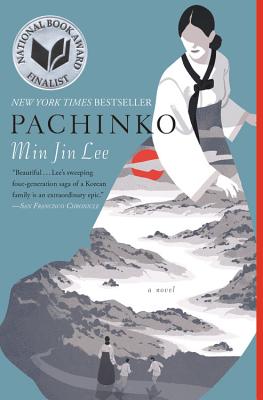
Streaming on Apple+
Pachinko (a former FBC book of the month!) is a sprawling and epic multi-generational family drama. It follows four generations across eight decades as they move from Korea to Japan, where they face persistent and sometimes violent discrimination. It’s a breathtaking book–in terms of its scope and also in that I literally found it hard to breathe because I sobbed so hard when reading a particular section. Focusing on a willful and resourceful Sunja, whose choices as a young girl impact her family for generations, as she becomes a fierce and loving matriarch, this book tells so many stories–stories about history, and familial legacy and, above all, about love–in a myriad of forms–and the way it can endure and persist through time.
The Apple+ adaptation, which came out last year, is often joyful and fun in spite of all of these heavy themes. But it doesn’t gloss over them either, handling the difficult history described in the book with seriousness. The show focuses much more on Sunja’s grandchildren than the book, making it more contemporary, and offers new life and more depth to many of its characters. This is a rare kind of TV adaptation that adds layers to a book instead of dumbing it down. I can’t wait until the next season comes out in April.
Lessons in Chemistry by Bonnie Garmus
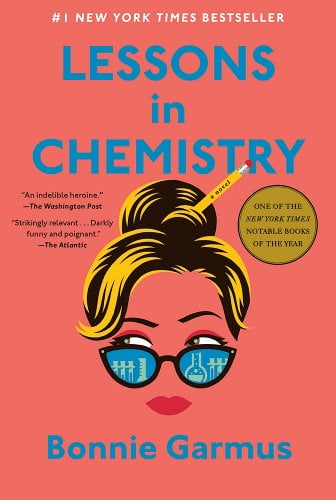
Debuting on Apple+ this year
Lessons in Chemistry was one of my favorite new books of last year and I almost didn’t read it. Based on the title and the lipsticked woman on the bright pinky-orange cover, I assumed this would be a romance that skewed a bit a too cute for my tastes. But this story following the intensely intelligent and infinitely likable Elizabeth Zott as she attempts to find her place as a chemist in a deeply misogynistic 1960s America is anything but. The plot, which at one point leads Zott to teach housewives about science through a widely-beloved cooking show, does include a love affair with another chemist, but mostly it is about Zott’s love of her field–even when it clearly doesn’t love her back. It is a zany, sometimes absurdist, often touching book that I loved reading. I am deeply excited to reenter the world Garmus has created and to see Brie Larson’s portrayal of Zott later this year.
Kindred by Octavia Butler
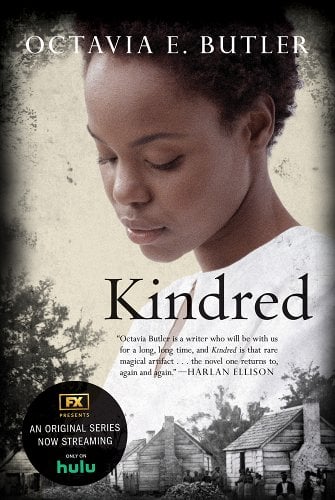
Streaming on Hulu
Kindred is a masterpiece of a book. I found it to be the most haunting of Butler’s novels because, although there are elements of fantasy, the most difficult aspects to contend with are ones that are based in our actual past. Following Dana Franklin (Dana James on the TV show), a Black woman in America, as she is wretched again and again to the past to aid a young boy during the time of slavery, there are shocking moments of violence in the book that have stuck with me though it has been years since I first read it. Bearing this in mind, I knew that the TV adaptation would be heavy and difficult to bear at times. But I was surprised by the way the show unfolded. As Alana and Lillie spoke about in-depth on the podcast, the adaptation took a lot of liberties and made a lot of additions to the novel’s text.
The show was made much more contemporary and the racial discussion is not just limited to the time Dana spends among slaves. It is also a prominent facet of her present-day existence in LA. Alana and Lillie were a little underwhelmed by this adaptation, but I thought it was engrossing and expanded upon Butler’s work in interesting and unexpected ways. Sadly, Kindred was cancelled after one season, but at least it revived interest in the book so we’ll count it as a win.
Fleishman Is in Trouble by Taffy Brodesser-Akner
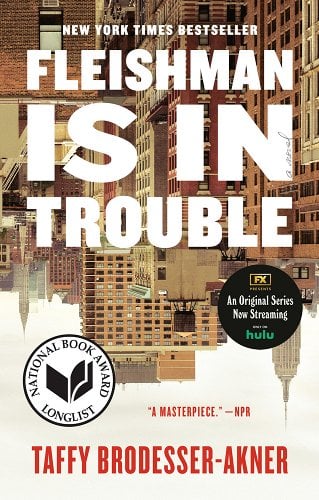
Streaming on Hulu
Fleishman Is in Trouble is the rare instance where I watched the adaptation before reading the book based on all the buzz the show was getting. And, at first, I hated it. I hated Toby Fleishman’s whiny, woe-is-me reaction to the disappearance of Rachel, his ex-wife and the way in which he perceives himself as a martyr for parenting his children in her absence. I felt no love for Rachel either, in the show’s portrayal of her through Toby’s eyes–her obsession with wealth and its signifiers and resulting devotion to her work to the detriment of her children.
So, I gave up after a few episodes–until a friend knowingly told me that I needed to see how it unfolded. I won’t spoil this for you, but it becomes a much deeper, nuanced show than it let on at first–about the pressures of motherhood, the difficult transition from youth to middle age, and the ways in which it might be very easy to blame your partner for the disconnect between how you imagined life and how it seems to have turned out.
The show is definitely unrelatable at times in the fact that the kind of despair it shows is a very privileged kind of angst. But it is also smart and moving and nuanced in ways that I didn’t expect it to be. I put the book on hold at my library as soon as I finished watching. And, based on the amount of time I’ve been waiting for it, I’m not the only one who had the same idea.
Every Elena Ferrante Book Adaptation
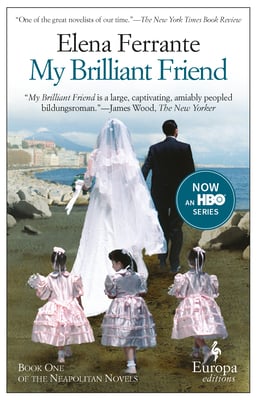
Streaming on HBO and Netflix
Elena Ferrante’s books seem to lend themselves to seamless adaptation. There are a lot of reasons for this. She knows how to set a scene. After reading her Neapolitan Novels — a quartet of books which starts with My Brilliant Friend, and continues with The Story of a New Name, Those Who Leave and Those Who Stay, and finally The Story of the Lost Child — I felt like I spent an extended stay in the Naples she described, like I could draw a map of it and point you to the nearest fruit stand or grocery story. It can be a dark place, but it is one I know well. I also felt like I had grown up with all of her characters. I don’t just mean Lenu and Lila, the girls at the center of the story, but their friends, their love interests, their parents, and teachers–even the peripheral people in their lives. The Neapolitan Novels, like Pachinko, are another sprawling story–following Lenu and Lila throughout their lives, from girlhood to motherhood any beyond–and also tracing Italy’s history over that period through their engagement with its social and political movements. I have loved watching HBO adapt each book of the series into its own season. The adaptation is impeccably cast and is true to the books in so many important ways. Netflix’s adaptations of The Lost Daughter, a movie, and The Lying Lives of Adults, a series released this year, are also excellent, offering glimpses at other strong and beautifully flawed female Ferrante characters in different time periods.

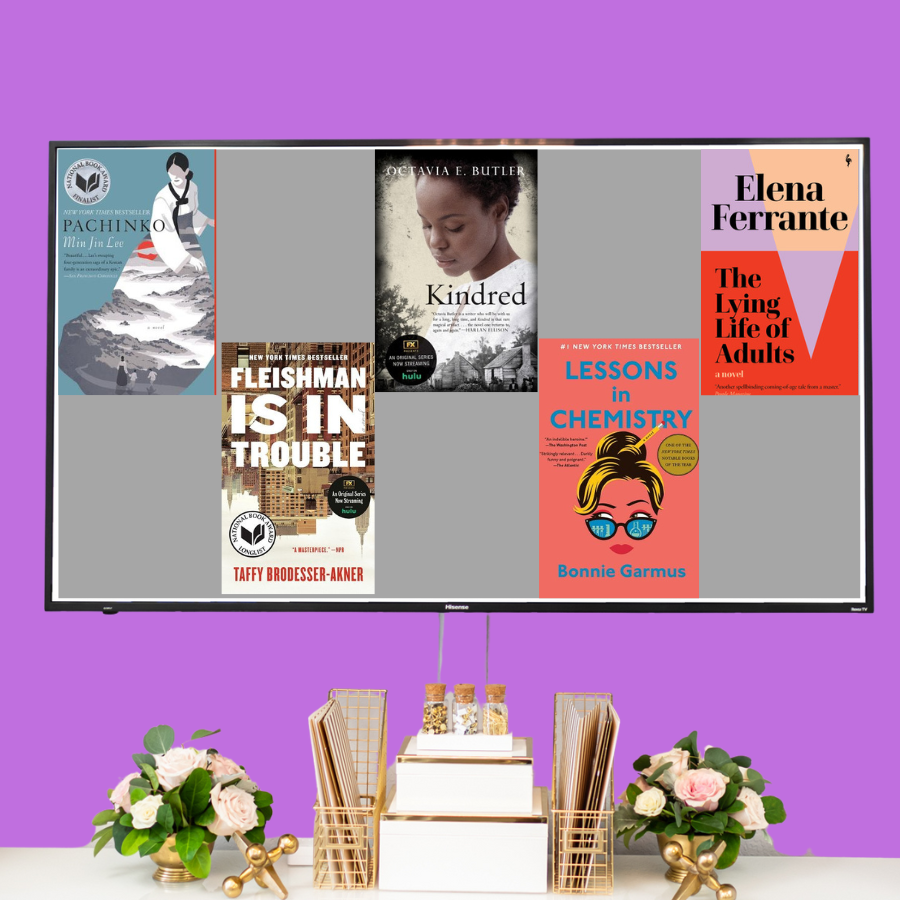
![Did you know we offer audiobook memberships? 🎧️
For a limited time, you can join for just $20 when you use code AUDIO at checkout!
Here’s what you’ll get:
🎧️The audiobook of the month (or swap it for one of your choice!)
💻️Access to our online community
📚️Invitations to virtual events, moderated discussions, and author Q&As
📖The chance to suggest titles and vote for our next Book of the Month
Lock in your audiobook membership at $20 today by visiting our website and using code AUDIO for that $5 discount!
This offer is only available to new members and for a limited time.
[alt text: white text on a purple background: New Member Special: Audiobooks Count! Audiobook Membership only at $20. Join by November 9th to gain access to our online community and join the conversation as we dive into our November theme: Trans Voices!. An image of a phone playing the auidobook of THE T in LGBT by Jamie Raines is in the left side of the square image]
#bookstagram #booksubscription #bookofthemonth #bookcommunity #shopsmall #bookclub #virtualbookclub #feministbookclub
](https://www.feministbookclub.com/wp-content/plugins/instagram-feed/img/placeholder.png)